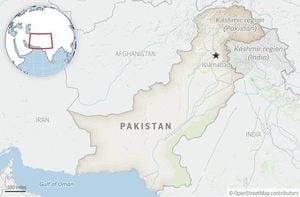On the eve of a seismic shift in American public broadcasting, tensions between National Public Radio (NPR) and the Corporation for Public Broadcasting (CPB) have burst into public view, revealing a bitter dispute over the future of the nation’s public radio infrastructure. The conflict, which has simmered throughout 2025, reached a boiling point on September 26, when NPR asked a federal judge to block CPB from awarding a $57.9 million grant to a newly formed consortium of public media institutions. The grant would fund operation of the satellite system that has, for more than four decades, connected hundreds of public radio stations and producers across the country.
This legal maneuver comes at a precarious moment for public media. Earlier this year, Congressional Republicans, acting at the behest of President Donald Trump, moved to strip public broadcasting of all federal funding previously approved for the next two years. As reported by NPR, this decision means that the critical subsidy sustaining public radio and television will evaporate with the new federal fiscal year, beginning September 30, 2025.
For decades, NPR has managed the satellite-based system that allows public radio stations—many of them independent from NPR itself—and other producers to air and share programming nationwide. The disputed $57.9 million grant is not part of NPR’s own annual operating budget, which typically accounts for just 1% to 2% of its funding. By contrast, PBS member stations receive about 15% of their budgets from CPB, and public radio stations about 10%, though these figures can vary significantly, according to NPR’s reporting.
The specific funding for the satellite distribution system is calculated separately from the money allocated to NPR and its member stations. In early April 2025, CPB had informed NPR that it would soon receive more than $30 million to cover the next three years of operating the service, plus the balance for the current year. However, CPB abruptly reversed course, citing a board-level decision that NPR could not be involved. NPR’s court filings allege that this reversal was sudden and unexpected, leaving the organization reeling.
On September 26, CPB announced it was awarding the contract to Public Media Infrastructure (PMI), a new consortium comprising New York Public Radio, PRX, American Public Media, and Station Resource Group. The National Federation of Community Broadcasters, representing smaller stations not affiliated with NPR, is also a participant.
CPB President and CEO Patricia Harrison defended the decision in a public statement, saying, "By awarding this grant to PMI, CPB is placing trust in stations to drive the future of radio content distribution, ensuring that interconnection is not only reliable but also innovative, representative and sustainable." She added, "This decision reflects CPB's commitment to support the entire public media system, especially rural and community stations, and to prepare the system for the future."
The backdrop to this funding drama is a broader political battle. In May 2025, President Trump issued an executive order banning CPB from spending any federal money on NPR. NPR and three of its Colorado member stations are now suing the White House, arguing that the order violates their Constitutional protections and constitutes unlawful retaliation for exercising free speech. Trump has not minced words in his public attacks, calling NPR and PBS "monsters" and accusing them of bias.
NPR’s Chief Executive, Katherine Maher, voiced her organization’s reluctance to take legal action but underscored the stakes in a note to member station officials. "We seek a clear judgment that finds the illegality and unconstitutionality of this executive order, and, in doing so, establishes definitively that public media enjoys the same protections from viewpoint discrimination as any other entity of the free press," Maher wrote. She continued, "We enter into this motion with great reluctance. This decision has undercut the bonds between our two organizations forged over many decades of service to the American people, and stands as a regretful coda to CPB's prior history of support for the First Amendment."
NPR’s legal team, led by Miguel A. Estrada and Theodore J. Boutros, Jr., filed a motion for a temporary restraining order, with a hearing scheduled for September 30—the day before federal funding for public media disappears. The legal team alleges that CPB’s actions amount to "bending to the Trump administration's will" and violate both the First Amendment and the Public Broadcasting Act of 1967. Their filing states, "CPB is now poised to do the Order's bidding, in contravention of both the First Amendment and the express mandates of the Public Broadcasting Act of 1967."
Behind the scenes, the unity of public media institutions has frayed. Although NPR, CPB, and PBS publicly presented a united front during their campaign to save taxpayer subsidies, sources familiar with internal discussions say that CPB and PBS executives privately told some lawmakers they would be satisfied if funding could be preserved for public media—especially the stations—even if NPR lost further federal support. These sources spoke on condition of anonymity, given the politically sensitive nature of the dispute.
Fueling the controversy, NPR has faced heightened scrutiny for alleged ideological bias, with criticism intensifying after a 2024 essay by a senior business editor who later left the network. During House hearings in late March 2025, Republicans spotlighted years-old social media posts by Maher that expressed liberal views and support for Joe Biden’s 2020 presidential campaign, raising questions about NPR’s impartiality.
According to NPR’s legal filings, the saga took a dramatic turn on April 2, when CPB executive Kathy Merritt affirmed that the corporation had approved NPR’s contract extension and agreed to transfer more than $35 million to fulfill both the current and new contracts. Yet, just days later, as Trump renewed efforts to eliminate federal subsidies for public media, Merritt informed NPR’s Chief Operating Officer that CPB now wanted to provide funding to an entity with no ties to NPR.
Trump’s formal request to rescind federal funding for public media reached Congress on May 1. In the run-up to the congressional vote, Trump warned Republicans that he would not campaign for anyone who failed to support the measure. Amid this turmoil, NPR unveiled a new initiative to create a "best-in-class terrestrial distribution platform for live broadcast," aiming to transform how public radio stations receive programming nationwide. Despite this, CPB proceeded with its plan to put the contract out for bidding.
In its court documents, NPR warns that CPB’s move to sever its contract "threatens NPR's contractual relationships with the Interconnected Stations and undermines the hard-earned trust that NPR has built with those stations over decades of service." NPR argues that, without a restraining order, it will be unable to win back the contract in court, as CPB will be reduced to a skeleton crew winding down its operations.
CPB, for its part, maintains that its actions are in the best interests of public radio’s future. In a statement, CPB said it was "confident that our actions serve the best interests of the future of public radio." The corporation expressed disappointment that NPR is "forcing CPB to expend scarce funds that would otherwise support the public media system in defending a lawsuit that has no merits and ultimately does not benefit the system."
Maher, in her note to station officials, emphasized that NPR’s paramount concern is "the integrity and stability of the public radio system." She also pledged to work with the new Public Media Infrastructure coalition to ensure that the system remains "vital and robust."
The fate of public radio’s connective tissue now hangs in the balance, with a federal judge set to hear NPR’s motion just as the clock runs out on federal funding. As the outcome of this high-stakes legal and political drama unfolds, the future of American public broadcasting—and the millions of listeners who rely on it—remains uncertain.



